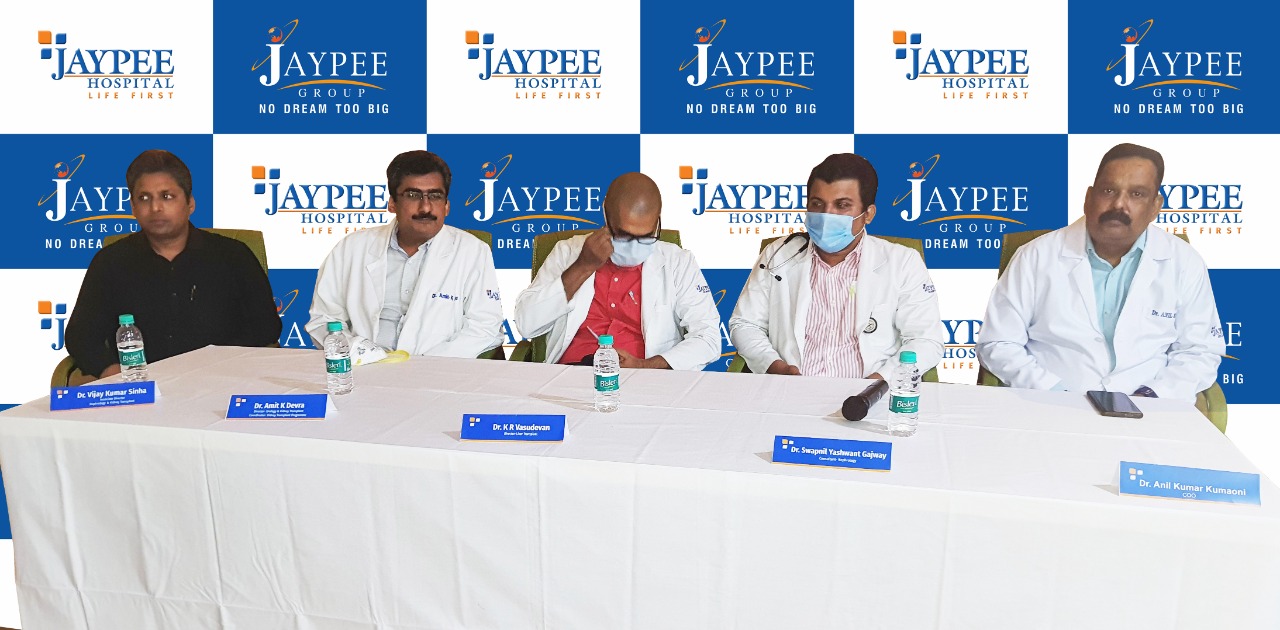August 13 every year is celebrated as ‘World Organ Donation Day’ across the world. It’s a day dedicated to creating awareness about organ donation. Every year thousands of lives are lost due to organ failure. Organ donation is the noblest way to living beyond one’s death and gives others a new lease of life. To advocate the cause of organ donation, Jaypee Hospital organised a public talk to make people aware about the cause. The focus of the event is to educate the masses and help save precious lives.
This event was aimed to felicitate brave souls who had the courage to save someone’s life by donating their own organs and thereby bust the myths related to organ donation. The event saw participation from donor and majorly donor families, who donated their organs to save someone’s life. The event was addressed by Dr. K R Vasudevan-Director, Department of Liver Transplant, Dr. Amit K. Devra- Director, Coordinator Kidney Transplant Programme, Department of Urology & Kidney Transplant, Dr. Vijay Kumar Sinha- Associate Director, Department of Nephrology & Kidney Transplant and Dr. Swapnil Yashwant Gajway, Consultant- Nephrology.
Dr. Amit K. Devra, Director, Coordinator Kidney Transplant Programme, Department of Urology & Kidney Transplant, Jaypee Hospital said, “In Living Donor Organ Donation, a person can donate his one kidney to his loved one without affecting his kidney function or health. Before kidney donation, one must have a normal kidney function. There are some medical conditions that could prevent you from being a living donor. Although recovery period varies but most of the donors will return to their pre-donation health within 1 month. To increase the acceptance of donor surgery, now a days harvesting is being done laparoscopically that provides lesser pain and better cosmetic outcome. In deceased Donor Organ Donation, a person can donate multiple organ and tissues after (brain-stem/cardiac) death. His/her organ continues to live in another person’s body. Through such platforms, we aim to drive the cause of organ donation and make more and more people aware about the noble cause.”
India’s Statistical Data as of 2015 shows that in response to the demand for 1.75 lakh kidney transplants, only 5,000 transplants were completed. With 50,000 people dying of terminal liver disease, only 1000 got transplants. These statistics are even more distressing in organs like hearts and lungs. About 0.5 million people in India die every year from causes that could have been prevented by organ transplants that were not available to them. According to estimates, almost a quarter-million await a kidney transplant, but no more than 5 per cent can avail it. India has abysmal low rates of organ donation and compared to other western countries. Every single day, at least 15 patients die waiting for an organ and every 10 minutes a new name is added to this waiting list. Organ donation rates in India sit at 0.01 percent; a miniscule figure in comparison to countries like Croatia’s which sits at 36.5 percent and Spain’s at 35.3%.
Dr. K R Vasudevan, Director, Department of Liver Transplant, Jaypee Hospital said, “When alive, a person can save at least one life by donating his organs, whereas a brain dead patient can give a gift of life to at least 3-4 people. Organ donation is the process of retrieving or procuring an organ legally with the intention of being able to medically help someone in need. Consent is given either by the donor while they’re still alive or after death by their next of kin. A living donor’s liver fully regrows within 4 months and will ultimately regain full function. The donated portion does the same for the recipient.”
Dr Vijay K. Sinha, Associate Director, Department of Nephrology & Kidney Transplant, Jaypee Hospital said, “Due to the Covid‐19 pandemic caused by SARS‐CoV‐2, transplant programs worldwide have been severely impacted with dwindling numbers of transplantations performed and a complete halt in several areas. Depending on the severity of organ failure, patients may stand a higher risk of dying from their disease related complications than due to contracting COVID. It is therefore time to reassess our approach to organ donation and transplant by moving forward but with appropriate caution. Organ donation in India is only just beginning to take off – the reason for the delay being lack of awareness, spiritual belief of life after death, and generally negative attitudes towards organ donation.”
Dr. Swapnil Yashwant Gajway, Consultant- Nephrology, Jaypee Hospital said, “In India, there are many myths associated with organ donation, owing to which there is a lack of willingness and awareness, leading to a low organ donation ratio. India is struggling with an acute shortage of organs for transplantation and the numbers highlight the crucial gap between the number of organs required and the organs available for transplantation. This gap is very unfortunate as organs from an individual can save up to 8 lives.”
Off late, through the coordinated efforts of various stakeholders, there has been a conscious rise in the rate of organ donation pledges. Many successful transplants have been conducted at Jaypee Hospitals, saving lives through timely transplants, which has been a result of quick coordination between the organ transplant teams and NOTTO. Jaypee hospital has successfully conducted 300 numbers of liver transplantation and 670 kidney transplants so far.











